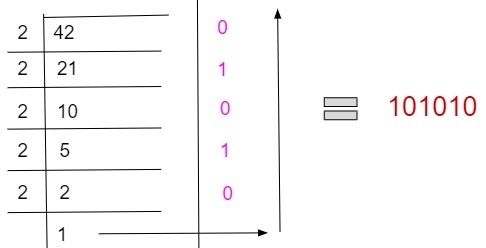
 Data Structure
Data Structure Networking
Networking RDBMS
RDBMS Operating System
Operating System Java
Java MS Excel
MS Excel iOS
iOS HTML
HTML CSS
CSS Android
Android Python
Python C Programming
C Programming C++
C++ C#
C# MongoDB
MongoDB MySQL
MySQL Javascript
Javascript PHP
PHP
- Selected Reading
- UPSC IAS Exams Notes
- Developer's Best Practices
- Questions and Answers
- Effective Resume Writing
- HR Interview Questions
- Computer Glossary
- Who is Who
Program for Decimal to Binary Conversion in C++
Given with a decimal number as an input, the task is to convert the given decimal number into a binary number.
Decimal number in computers is represented with base 10 and binary number is represented with base 2 as it has only two binary digits 0 and 1 whereas decimal numbers can be any numeric digit starting from 0 – 9.
To convert a decimal number into a binary number follow the given steps −
- Firstly divide the given number with the base value of conversion number e.g. dividing 42 by 2 because we need to convert 42 into a binary numbers which have base 2 and then obtain a quotient and store it. If the remainder is 0 store the bit as 0 else 1.
- Divide the obtained quotient with the base value of binary number which is 2 and keep storing the bits.
- Keep doing right shift to the stored bits
- Repeat the step until the remainder left indivisible
Given below is the pictorial representation of converting a decimal number into a binary number.

Example
Input-: 42 Divide the 42 with base 2 : 42 / 2 = 0 (remainder) 21(quotient) Divide quotient with base: 21 / 2 = 1(remainder) 10(quotient) Divide quotient with base: 10 / 2 = 0(remainder) 5(quotient) Divide quotient with base: 5 / 2 = 1(remainder) 2(quotient) Divide quotient with base: 2 / 2 = 0(remainder) 1(quotient) Now reverse the bits to obtain final value. Output-: 101010
Algorithm
Start Step 1-> declare function to convert decimal to binary int convert(int num) Loop For int i = 31 i >= 0 i— Set int k = num >> i If (k & 1) Print "1" End Else Print "0" End End Step 2-> In main() Declare and set int num = 42 Call convert(num) Stop
Example
#include <iostream>
using namespace std;
//convert decimal to binary
int convert(int num) {
for (int i = 31; i >= 0; i--) {
int k = num >> i;
if (k & 1)
cout << "1";
else
cout << "0";
}
}
int main() {
int num = 42;
convert(num);
}
Output
IF WE RUN THE ABOVE CODE IT WILL GENERATE FOLLOWING OUTPUT
00000000000000000000000000101010

Advertisements
